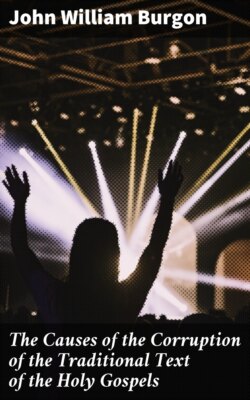Читать книгу The Causes of the Corruption of the Traditional Text of the Holy Gospels - John William Burgon - Страница 39
На сайте Литреса книга снята с продажи.
§ 1.
ОглавлениеTable of Contents
It may seem to a casual reader that in what follows undue attention is being paid to minute particulars. But it constantly happens—and this is a sufficient answer to the supposed objection—that, from exceedingly minute and seemingly trivial mistakes, there result sometimes considerable and indeed serious misrepresentations of the Spirit's meaning. New incidents:—unheard-of statements:—facts as yet unknown to readers of Scripture:—perversions of our Lord's Divine sayings:—such phenomena are observed to follow upon the omission of the article—the insertion of an expletive—the change of a single letter. Thus παλιν, thrust in where it has no business, makes it appear that our Saviour promised to return the ass on which He rode in triumph into Jerusalem[96]. By writing ω for ο, many critics have transferred some words from the lips of Christ to those of His Evangelist, and made Him say what He never could have dreamed of saying[97]. By subjoining ς to a word in a place which it has no right to fill, the harmony of the heavenly choir has been marred effectually, and a sentence produced which defies translation[98]. By omitting τω and Κυριε, the repenting malefactor is made to say, 'Jesus! remember me, when Thou comest in Thy kingdom[99].'
Speaking of our Saviour's triumphal entry into Jerusalem, which took place 'the day after' 'they made Him a supper' and Lazarus 'which had been dead, whom He raised from the dead,' 'sat at the table with Him' (St. John xii. 1, 2), St. John says that 'the multitude which had been with Him when He called Lazarus out of the tomb and raised Him from the dead bare testimony' (St. John xii. 17). The meaning of this is best understood by a reference to St. Luke xix. 37, 38, where it is explained that it was the sight of so many acts of Divine Power, the chiefest of all being the raising of Lazarus, which moved the crowds to yield the memorable testimony recorded by St. Luke in ver. 38—by St. John in ver. 13[100]. But Tischendorf and Lachmann, who on the authority of D and four later uncials read 'οτι instead of 'οτε, import into the Gospel quite another meaning. According to their way of exhibiting the text, St. John is made to say that 'the multitude which was with Jesus, testified that He called Lazarus out of the tomb and raised him from the dead': which is not only an entirely different statement, but also the introduction of a highly improbable circumstance. That many copies of the Old Latin (not of the Vulgate) recognize 'οτι, besides the Peshitto and the two Egyptian versions, is not denied. This is in fact only one more proof of the insufficiency of such collective testimony. [Symbol: Aleph]AB with the rest of the uncials and, what is of more importance, the whole body of the cursives, exhibit 'οτε—which, as every one must see, is certainly what St. John wrote in this place. Tischendorf's assertion that the prolixity of the expression εφωνησεν εκ του μνημειου και ηγειρεν αυτον εκ νεκρων is inconsistent with 'οτε[101]—may surprise, but will never convince any one who is even moderately acquainted with St. John's peculiar manner.
The same mistake—of 'οτι for 'οτε—is met with at ver. 41 of the same chapter. 'These things said Isaiah because he saw His glory' (St. John xii. 41). And why not 'when he saw His glory'? which is what the Evangelist wrote according to the strongest attestation. True, that eleven manuscripts (beginning with [Symbol: Aleph]ABL) and the Egyptian versions exhibit 'οτι: also Nonnus, who lived in the Thebaid (A.D. 410): but all other MSS., the Latin, Peshitto, Gothic, Ethiopic, Georgian, and one Egyptian version:—Origen[102]—Eusebius in four places[103]—Basil[104]—Gregory of Nyssa twice[105]—Didymus three times[106]—Chrysostom twice[107]—Severianus of Gabala[108];—these twelve Versions and Fathers constitute a body of ancient evidence which is overwhelming. Cyril three times reads 'οτι[109], three times 'οτε[110]—and once 'ηνικα[111], which proves at least how he understood the place.
